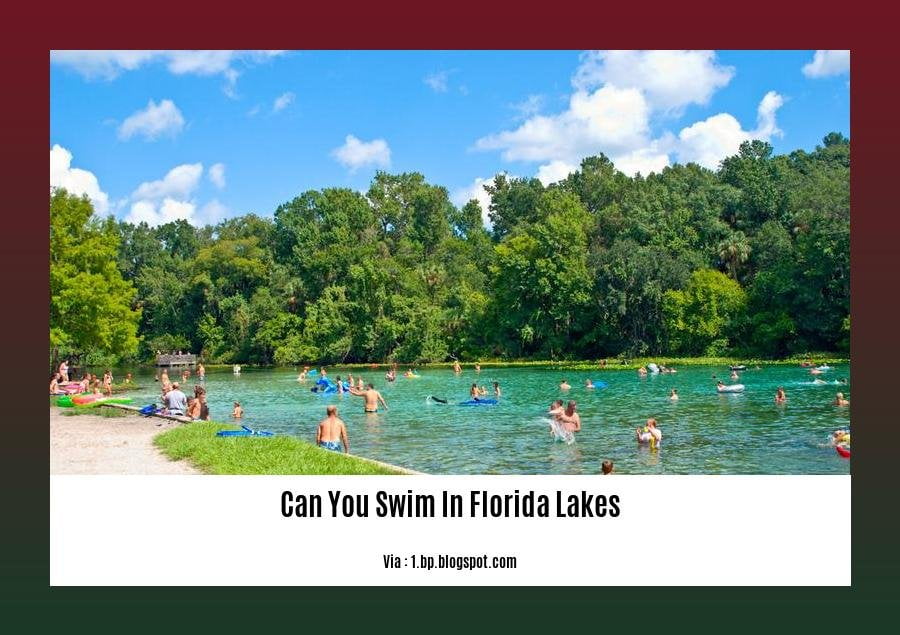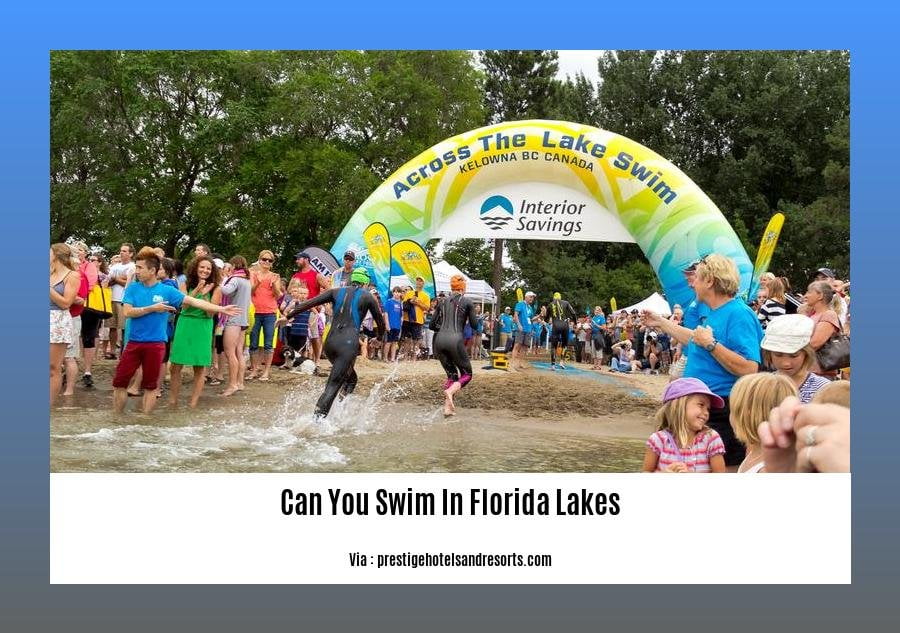Can you swim in Florida lakes? If you’re looking to dive into the Sunshine State’s beautiful aquatic oases, you’ve come to the right place. With this expert guide to safety, tips, and precautions, you’ll be well-equipped to make the most of your swimming adventures in Florida’s diverse and stunning lakes. As someone deeply passionate about Florida’s natural wonders and armed with years of experience as an outdoor enthusiast and travel writer, I’m here to provide you with valuable insights, ensuring your swimming experiences are not only enjoyable but safe as well.
Key Takeaways:
- Swimming in Florida lakes is generally safe, but it’s important to be cautious due to the presence of wildlife, including alligators and snakes.
- Alligators have been known to attack and kill people in Florida, so it’s crucial to take precautions when swimming in lakes.
- While not as safe as swimming in a pool, swimming in Florida lakes can still be enjoyable if proper research is done and popular, larger freshwater swimming spots are chosen.
- It’s essential to exercise swimming safety measures to minimize the risk of encountering dangerous wildlife.
Can You Swim in Florida Lakes?

Florida is renowned for its stunning lakes and water bodies, drawing in outdoor enthusiasts and water lovers alike. But before you dive into the inviting waters, it’s crucial to understand the safety considerations and potential risks associated with swimming in Florida lakes. So, can you swim in Florida lakes? Let’s dive in and explore.
Understanding the Potential Risks
While swimming in Florida lakes can be an enjoyable experience, it’s important to be aware of the potential dangers that come with it. Florida’s freshwater bodies are home to a variety of wildlife, including alligators, snakes, and other potentially dangerous animals. Alligators, in particular, have been known to attack and even kill people.
Taking Precautions for a Safe Swim
Although the potential risks may seem daunting, there are precautions you can take to minimize those risks and still enjoy swimming in Florida lakes. Here are some important tips and precautions to keep in mind:
Research the Area: Before heading out for a swim, do your research and choose well-known freshwater swimming spots. These spots often have designated swimming areas and may be monitored for alligator activity.
Choose Larger Lakes: Opt for larger lakes as they tend to have fewer alligators and offer more space for swimming safely. Popular lakes like Lake Okeechobee, Lake George, and Lake Kissimmee are examples of larger, well-known freshwater swimming spots.
Practice Swimming Safety Measures: It’s crucial to exercise caution and follow basic swimming safety measures. Avoid swimming alone, stay within designated swimming areas, and always have a buddy or lifeguard present. Remember, safety should be your top priority.
Be Aware of Your Surroundings: Keep a vigilant eye on your surroundings and pay attention to any signs, warnings, or guidelines provided by local authorities. Look out for any sudden splashes, ripples, or signs of wildlife nearby.
Avoid Attracting Wildlife: To minimize the risk of encountering dangerous wildlife, avoid attracting them with food scraps or fishing bait. It’s important to respect their natural habitats and maintain a safe distance.
While these precautions can greatly reduce the likelihood of encountering any dangerous wildlife, it’s important to remember that swimming in Florida lakes is not as safe as swimming in a pool. Vigilance, awareness, and preparation are keys to enjoying a safe swim.
Conclusion
Swimming in Florida lakes can offer a wonderful experience, allowing you to immerse yourself in the state’s natural beauty. By staying informed, taking precautions, and being mindful of potential risks, you can confidently enjoy a refreshing swim in Florida’s beautiful lakes. So, can you swim in Florida lakes? Yes, you can, but it’s essential to prioritize safety along the way. So, dive in and embrace the aquatic wonders of the Sunshine State while ensuring your wellbeing and enjoyment.
Check out our updated article on driving through Death Valley right now to find out the current conditions and any travel advisories in place. Whether you’re planning a road trip or just curious, this article has all the details you need.
If you’re wondering about swimming in alpine lakes, we’ve got you covered! Get all the information you need about safety, best locations, and any restrictions in our comprehensive guide on swimming in alpine lakes. Dive into the pristine waters and enjoy a refreshing swim surrounded by breathtaking views.
Have you ever heard of the stunning Emerald Cove? If you’re considering taking a dip there, make sure to read our article on swimming in Emerald Cove. Discover the hidden gem and learn everything you need to know about this magical spot before planning your adventure.
Understanding the potential risks and safety precautions
Swimming in Florida’s lakes can be an exhilarating and refreshing experience, but it’s important to be aware of the potential risks and take the necessary safety precautions. Here, we’ll explore some key tips and guidelines to ensure you can enjoy a safe swim in Florida’s beautiful lakes.
1. Be aware of the wildlife: Florida’s lakes are home to a diverse range of wildlife, including alligators, snakes, and other potentially dangerous animals. Understanding the potential risks associated with interacting with these creatures is crucial. Remember to always maintain a safe distance from any wildlife you encounter and never swim with alligators under any circumstances.
2. Educate yourself: Research the lakes in the area you plan to visit and gather information about any potential risks or safety concerns. Look for well-known freshwater swimming spots that may be monitored for alligator activity, and consider opting for larger lakes as they tend to have fewer alligators and offer more space for safe swimming.
3. Follow safety guidelines: Practice swimming safety measures such as swimming with a buddy or lifeguard and staying within designated swimming areas. Pay attention to signs, warnings, and guidelines from local authorities to ensure you’re aware of any specific safety precautions or restrictions in place.
4. Avoid attracting wildlife: To minimize the risk of encounters with wildlife, avoid leaving food scraps or fishing bait in the water. These can attract animals and potentially create an unsafe situation. It’s essential to respect the natural habitat of the animals and not disturb or provoke them in any way.
5. Stay vigilant and aware: Be constantly aware of your surroundings while swimming in Florida’s lakes. Keep an eye out for any signs of wildlife activity or potential hazards. If you notice any unusual behavior or sense a potential danger, it’s best to exit the water immediately and seek assistance from local authorities if necessary.
Key Takeaways:
– Understand and respect the potential risks associated with swimming in Florida lakes, including encounters with wildlife.
– Research the lakes in your chosen area and choose well-known freshwater swimming spots that may be monitored for alligator activity.
– Follow safety guidelines such as swimming with a buddy or lifeguard and staying within designated swimming areas.
– Avoid attracting wildlife by not leaving food scraps or fishing bait in the water.
– Stay vigilant and aware of your surroundings while swimming, and exit the water immediately if you notice any signs of potential danger.
URL Sources:
1. Central Florida Paradise – Is it Safe To Swim In Lakes In Florida?
2. Floridaryt – Is It Safe To Swim In Florida Lakes?
Exploring the Different Types of Water Activities in Florida Lakes

Swimming in Florida lakes offers an array of water activities and experiences for outdoor enthusiasts and water lovers. From diving into crystal-clear waters to kayaking along picturesque shorelines, Florida’s lakes provide a paradise for adventure seekers. In this article, we will explore the different types of water activities that you can enjoy in Florida lakes, ensuring you have a memorable and safe experience.
Key Takeaways:
- Florida lakes offer a variety of water activities, including swimming, kayaking, paddleboarding, fishing, and boating.
- Before engaging in any water activities, it’s crucial to be aware of safety guidelines and possible risks associated with wildlife, such as alligators.
- Researching the lake area and choosing well-known freshwater swimming spots can provide a safer swimming experience.
- Opting for larger lakes can minimize the chances of encountering alligators and provide more space for safe swimming.
- Following safety measures, such as swimming with a buddy or lifeguard and staying within designated swimming areas, is essential.
- Pay attention to signs, warnings, and guidelines from local authorities to ensure a safe and enjoyable time in Florida’s lakes.
Swimming:
Swimming is one of the most popular water activities in Florida lakes. Whether you prefer a leisurely dip or an invigorating swim, the refreshing waters of Florida’s lakes will beckon you. However, it’s essential to swim safely and be aware of potential risks. Always choose well-known swimming areas that may be monitored for alligator activity, and avoid swimming in areas where alligators are known to be present. Remember, swimming with alligators is dangerous and should be avoided at all costs. By following these precautions, you can enjoy a delightful swimming experience in Florida’s lakes.
Kayaking and Paddleboarding:
Exploring Florida’s lakes on a kayak or paddleboard provides a unique perspective of the breathtaking landscapes. These activities allow you to glide through calm waters, observing the surrounding wildlife and enjoying the serenity of nature. From the scenic springs of Ichetucknee River to the peaceful waters of Blackwater River State Park, there are countless opportunities to paddle and explore Florida’s lakes. Just remember to wear a life jacket, stay alert for wildlife, and always paddle within your skill level.
Fishing:
Florida’s lakes are a haven for fishing enthusiasts, offering a diverse range of species and unparalleled angling experiences. Whether you prefer freshwater or saltwater fishing, Florida’s lakes are teeming with bass, catfish, sunfish, and more. Before casting your line, make sure to obtain the necessary fishing license and familiarize yourself with the fishing regulations for each lake. By practicing catch-and-release and respecting the environment, you contribute to the preservation of Florida’s aquatic ecosystems.
Boating:
Boating is a popular activity in Florida’s lakes, allowing you to cruise through the scenic waters and soak in the abundant sunshine. From pontoon boats to speedboats, there are various options to suit your preference. It’s important to be knowledgeable about boating safety regulations, including having proper navigation lights, life jackets for all occupants, and understanding the right of way rules. Responsible boating ensures a safe and enjoyable experience for everyone on the lake.
Conclusion:
Florida’s lakes offer a playground for water enthusiasts, with a wide array of activities to suit every taste. Whether you choose to swim, kayak, paddleboard, fish, or boat, it’s essential to prioritize safety and be aware of the potential risks associated with wildlife, such as alligators. By following safety guidelines, researching the area, and staying informed, you can explore the different types of water activities in Florida lakes and create lasting memories amidst the state’s beautiful aquatic oases.
Sources:
- Florida Fish and Wildlife Conservation Commission. (n.d.). Safety Tips For Swimming in Florida Waters. Retrieved from
- Central Florida Paradise. (n.d.). Is it Safe To Swim In Lakes In Florida? Retrieved from
Tips for a Safe and Enjoyable Swimming Experience in Florida Lakes
Florida’s lakes are known for their beauty and draw in outdoor enthusiasts and water lovers. But before you dive in, it’s important to understand the potential risks associated with swimming in these natural aquatic oases. From alligators to snakes and other dangerous wildlife, Florida’s lakes are home to a variety of creatures that require caution and respect. To ensure a safe and enjoyable swimming experience, here are some valuable tips and precautions to keep in mind.
Research the Area Before Swimming: Not all lakes in Florida are safe for swimming. It’s important to do thorough research and choose well-known freshwater swimming spots that may be monitored for alligator activity. Websites like Central Florida Paradise and Floridaryt offer valuable information and insights into the safety of specific lake areas.
Be Aware of Wildlife: Florida’s lakes are home to a variety of wildlife, including alligators, snakes, and other potentially dangerous animals. Always be aware of your surroundings and pay attention to signs, warnings, and guidelines from local authorities. Do not leave food scraps or fishing bait in the water, as this can attract wildlife.
Choose Larger Lakes: Larger lakes tend to have fewer alligators and offer more space for safe swimming. Opting for these lakes can reduce the potential risk of encountering dangerous wildlife.
Swim with a Buddy or Lifeguard: It’s always safer to swim with someone else, especially in unfamiliar waters. Having a buddy or trained lifeguard present can provide an extra layer of safety and support.
Stay Within Designated Swimming Areas: Many lakes in Florida have designated swimming areas that are marked and monitored for safety. It’s important to stay within these designated zones, as they are often cleared of potential hazards.
Test the Water Regularly: Just like with pool safety, it’s important to test the water in lakes for safety. This includes checking water quality, temperature, and clarity. If you have any concerns about the water conditions, it’s best to avoid swimming.
Be Prepared for Emergencies: Always be prepared for emergencies by knowing the location of the nearest medical facilities and having a phone with you in case you need to call for help. It’s also important to know basic first aid and CPR techniques.
While swimming in Florida lakes may not be as safe as swimming in a pool, by following these tips, you can enjoy a safe and enjoyable swimming experience in the Sunshine State’s beautiful aquatic oases. Remember, safety should always be a top priority when it comes to outdoor activities, and being aware of potential risks and taking necessary precautions will help ensure a positive experience.
Key Takeaways:
- Florida’s lakes are home to a variety of wildlife, including alligators, snakes, and other dangerous animals.
- Research the area before swimming and choose well-known freshwater swimming spots that may be monitored for alligator activity.
- Opt for larger lakes, as they tend to have fewer alligators and offer more space for safe swimming.
- Practice swimming safety measures, such as swimming with a buddy or lifeguard and staying within designated swimming areas.
- Be prepared for emergencies by knowing the location of medical facilities and having a phone with you.
- Regularly test the water for safety by checking water quality, temperature, and clarity.
- While swimming in Florida lakes may not be as safe as swimming in a pool, with vigilance, awareness, and preparation, you can enjoy a safe swim.
FAQ
Q1: Is it safe to swim in Florida lakes?
A1: Swimming in Florida lakes can be safe if certain precautions are taken. It is important to be aware that these lakes are home to various wildlife, including alligators. By following basic safety guidelines and being cautious, you can enjoy swimming in Florida lakes safely.
Q2: Are alligators a common threat in Florida lakes?
A2: Alligators are a potential threat in Florida lakes as there are over a million of them living in freshwater habitats. While alligator attacks are rare, they can still happen. It is crucial to be aware of their possible presence in or near the water and to avoid swimming with them at all costs.
Q3: How can I ensure my safety while swimming in Florida lakes?
A3: To ensure your safety while swimming in Florida lakes, it is recommended to choose larger, well-known freshwater swimming spots. Additionally, do thorough research before swimming in a specific area to understand any potential risks. It is also important to follow safety guidelines provided by the Florida Fish and Wildlife Conservation Commission, such as being aware of the presence of alligators and never swimming in areas where they are known to be present.
Q4: Can I swim in any lake in Florida?
A4: While Florida has numerous lakes, not all of them are suitable for swimming. It is important to do thorough research before going swimming in a particular lake to ensure its safety for swimming. Choosing larger, well-known freshwater swimming spots is generally a safer option.
Q5: What are some tips for swimming safely in Florida lakes?
A5: Some tips for swimming safely in Florida lakes include avoiding swimming with alligators, being aware of the possible presence of wildlife in or near the water, and following safety guidelines provided by authorities. It is also important to be cautious, exercise swimming safety measures, and choose swimming areas that have been deemed safe for recreational activities.
- Hollandale, MS: Where Delta History Meets Southern Charm - November 24, 2024
- Holdingford, Minnesota: A Small Town with a Big Heart and Gateway to Lake Wobegon - November 24, 2024
- Ellenboro, NC: Exploring Life in Rutherford County - November 24, 2024














